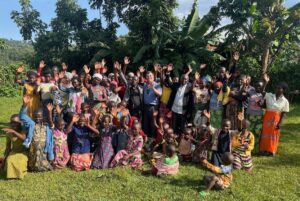Rwanda is known as “The Land of a Thousand Hills.” As one drives through this beautiful country, it seems to be a land of a million hills because the vehicle is always going up a hill, or down a hill, or navigating a curve. The countryside is filled with crops, as farmers cultivate tea, coffee, maize, wheat, sweet potato, bananas, and plantain among other agricultural products and, in certain areas, dairy cows. Rwandans fill the city streets and highways as they travel to the market, go to school, work, or make their way to a worship service.
Unfortunately, when the country of Rwanda is mentioned, one’s thoughts immediately turn to the 1994 Genocide. During one hundred horrific days, an estimated 1 million people—men, women, and children were killed. More than 75% of the Tutsi population (about 950,000 people) were wiped out and almost all Hutu moderates (about 50,000 people) were executed.
Although the genocide is over, the effects of it linger still thirty years later. The government is doing a good job of enabling the country to recover economically, but there are many lingering social and spiritual issues.

“Come over to Rwanda and help us!” was the invitation issued by Bishop Alfred, senior Pastor of Beth Ammi Christian Fellowship Church. “The people of Rwanda need God’s grace and forgiveness.” Persistent wounds need healing. Trust between people needs to be restored. Forgiveness needs to be shared. Those who grieve need the comfort and hope of Jesus who is the Resurrection and the Life. Widows and orphans need Jesus’ compassion. Congregations need church buildings. Pastors and other church workers need a salary that they and their family can live on, and the government requires that each pastor have a degree from an accredited institution. Pastors and laity need to be rooted deeply in God’s Word.
At Bishop Alfred’s invitation I traveled to Rwanda in 2018. I have since retuned three more times, with my wife, Sandra, accompanying me on two of those mission trips. I have been privileged to lead seminars for pastors and lay leaders on 1 Peter, Romans 1–8, 1 Corinthians 15 and, most recently, on The Lord’s Prayer. Sandra has had the opportunity to lead the ladies of Beth Ammi Christian Fellowship Church in seminars. While in Rwanda, I also travel with a translator to remote regions of the country so that I can visit with the local church leaders and preach at their worship services.
While Beth Ammi is a nondenominational church, my trips to Rwanda have connected me with Rwandan confessional Lutheran church bodies. My mission trip in April included having pastors from the Independent Evangelical Lutheran Church – Rwanda and Lutheran Mission in Africa (Rwanda) – Synod of 1000 Hills participate in the three-day seminar on The Lord’s Prayer. At the beginning of this seminar, I was able to give each participant (100 people in all) a copy of Martin Luther’s Small Catechism in Kinyarwanda (the language spoken in Rwanda) which I was able to purchase from the Lutheran Heritage Foundation.

I led a half-day seminar on Psalms 90–91 with pastors and future church workers of the Lutheran Mission in Africa led by Bishop Selestine Seburikoko. I also preached at a communion service.
I was able to visit with some of the leaders of the Independent Evangelical Lutheran Church – Rwanda, which is led by Bishop Dr. Mbarushimana Bernard. I preached at two of their churches. One of the congregations located in Kagitumba was especially on my list to visit because St. James, Grand Rapids has been providing financial assistance to the congregation (led by Pastor Eldaphonce) so that 20 unwed mothers in the community may have the essentials needed to feed and care for their child(ren).
What do the churches need? How might we help them? The needs of the parishes are numerous, but they include:
- Biblically based, confessionally sound teaching and training of the pastors;
- Church buildings that meet code;
- Salaries for the pastors so they are not living in poverty and instead, are able to focus their efforts on being pastors to the people/community;
- Transportation for the pastors/evangelists;
- Basic food items for unwed mothers;
- Daily food (like porridge) for most children;
- Training/skill development for the unwed moms;
- School tuition provided so children can attend the public school;
- Goats, pigs, chickens for each household;
- In the case of the IELC (Rwanda) they are seeking membership in the confessional International Lutheran Council with the hope that membership will open doors to Lutheran church bodies that will support them financially.
Beth Ammi Christian Fellowship Church has formally asked me to return to Rwanda on an annual basis so that I may be a mentor and Bible teacher to their pastors and other church leaders.
I would be happy to visit your congregation to talk more about the churches in Rwanda and how we might support them. If you have any comments/questions, please contact me!
Please note: This mission outreach was supported in part through the Michigan District, LCMS Igniter Grant. This grant can be used to assist a local congregation with an international mission project involving human care and gospel proclamation.
Photos courtesy of Glenn Schaeffer



